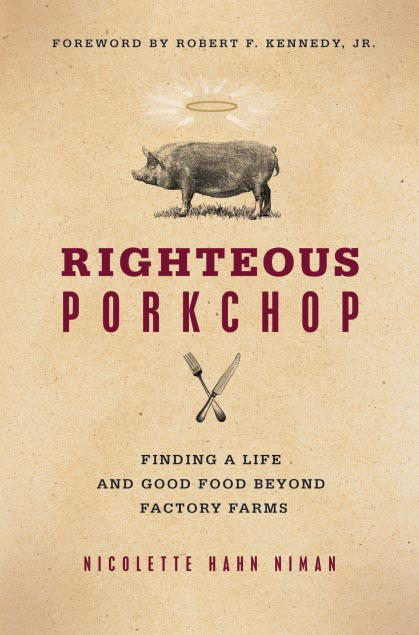 |
||
|
THE SMOKING POET |
||
|
|
|||
|
Vote with Your Fork: A Book Review on Righteous Porkchop by Olga Bonfiglio
ˇ Hardcover:
336 pages ˇ Publisher:
William Morrow, 2009 ˇ Price:
$23.99 ˇ ISBN-10:
0061466492 ˇ ISBN-13:
978-0061466496 What’s
black and white and “red” all over? Answer: the newspaper. However, finding important news about
how our food is grown or raised in the newspaper can be difficult. Enter Nicolette Hahn Niman and her new book, The Righteous Porkchop. The urban lawyer, former city commissioner,
vegetarian and environmentalist knew nothing about factory farms until she joined Robert F. Kennedy, Jr.’s environmental
group, Waterkeeper in 2000 in New York City as a senior attorney. Her first big assignment was to take charge of a fledgling
national hog campaign, which involved investigating hog factory farms in North Carolina, including their inhumane animal confinement
and devastating water and air pollution—and her life changed forever. At first, Hahn Niman baulked at the prospect
of researching “poop,” but after visiting a couple farms, she became interested—and concerned—not
only about the way meat was raised and the environmental damage it was doing but the costs to human health and the traditional
farmers’ way of life. And she was a vegetarian. Hahn Niman tells a good, compelling story
and it’s one readers will find difficult putting down. It provides enough technical details to get the picture about
what is happening to farm animals that eventually become our meat. However, the facts are accessible enough and not overwhelming
or burdensome to non-technical people, probably because it is written from the point of view about her own journey of discovery.
Hahn Niman does the research for readers
but never leaves them behind as she describes the disgusting practices of industrial factory farming—which are all done
for the almighty dollar and without concern for the animals or the health of people that will eventually eat them. She also explains how her romance and
marriage to Bill Niman, founder of the Niman Ranch, a collective of traditional farms and ranches, led her to become a rancher
by simply sitting on the range and watching the cattle graze on grass—not corn! "I especially enjoyed watching our cattle
interact with one another and with other species—the horses, deer, dogs, egrets, and coyotes. The cattle were anything
but the slothful, docile bovine “Elsie” characters known to me from advertisements and children’s stories.
At various times they were playful, aggressive, friendly, happy, demanding, timid, bold, and curious. Gradually, I learned
how to interpret their body language and vocalizations.…I got to know the cattle and they got to know me. A mutual trust
evolved." She acquires an affection for the cattle
and their need for the range. And in doing so, she shows how it is possible to make a living on traditional farming methods
that were prevalent prior to World War II. Readers will get into the book because
it becomes clearer and clearer with each chapter that what you eat impacts your health. But Nicolette doesn’t stop with
the problem. She provides hope for the future in the midst of corporatism and its flailing attempts to justify this system
and retain its dominance through citizen action. In fact, this has become her mission as a rancher, writer and environmental
activist and she has credibility in this venture as a dynamic former two-term city commissioner in Kalamazoo, Mich. Although Hahn Niman’s main focus
is on cattle, she also tells what’s happening to factory farm chickens, pork, fish, veal and dairy cows as well as how
the factory farm system got started and evolved. Like so many other books and films that
reveal the truth about how our food is grown and raised, Righteous Porkchop provides the picture that our media still typically
resist until it is too late, that is, when people get sick or die from tainted food products. This book makes the message
more mainstream and more urgent. Read it and pass it on to your friends. Let’s rumble! |
|||
|
Feedback, submissions, ideas? E-mail thesmokingpoet@gmail.com |
|||
